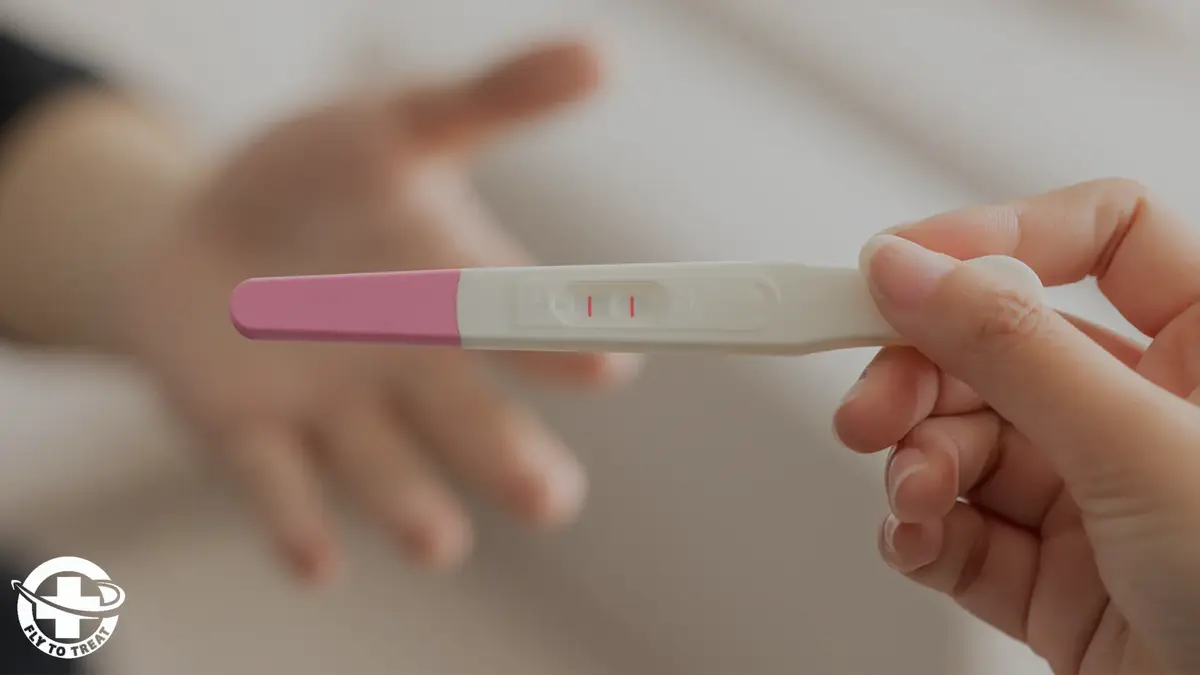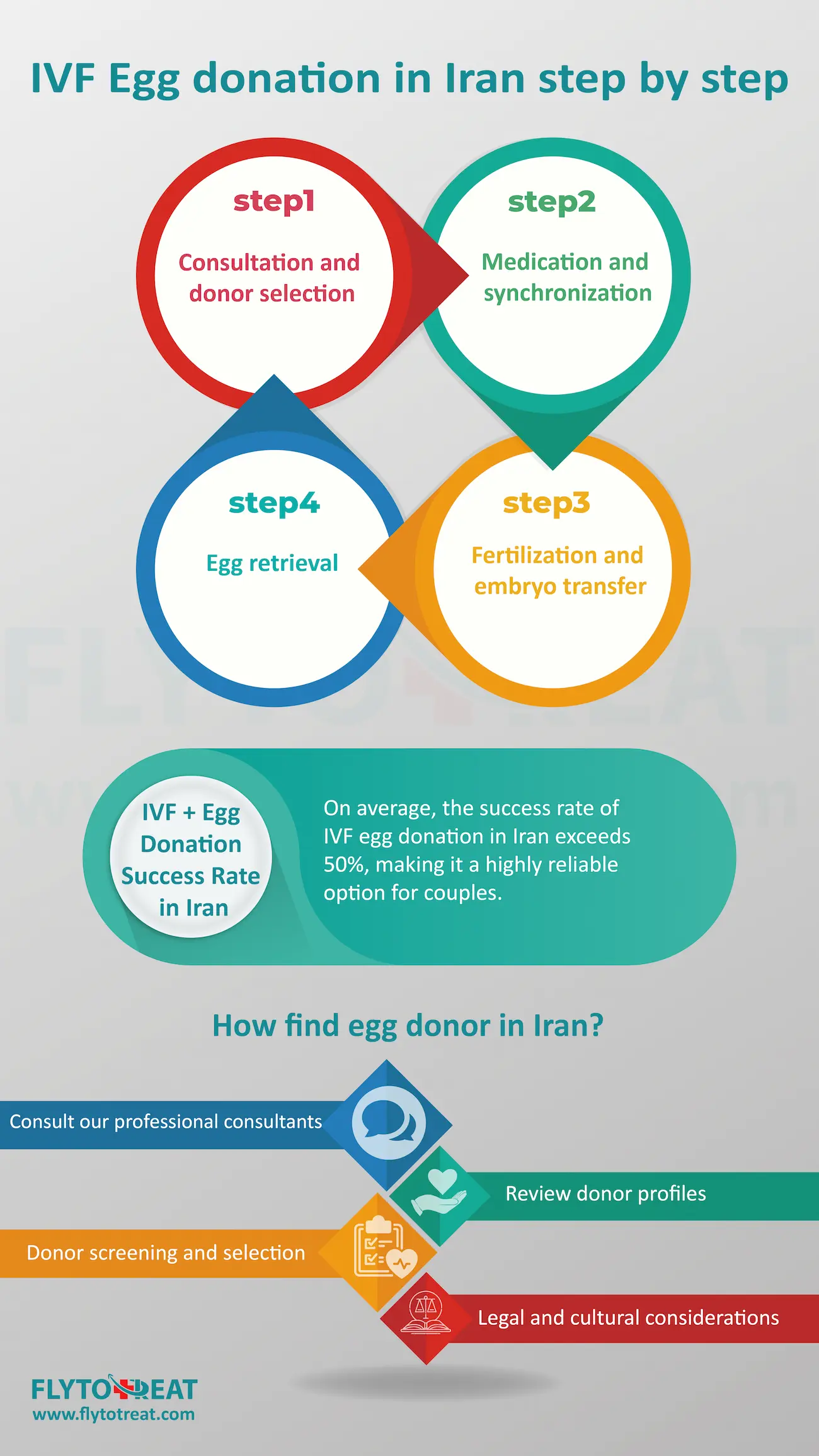
IVF Egg donation in Iran step by step
The egg donation journey in Iran has become a well-structured and reliable option for couples seeking fertility treatments. With its comprehensive approach, Iran is recognized for offering access to Middle Eastern egg donors and high success rates for procedures like IVF egg donation. This article will address common questions such as "What is the success rate of IVF + Egg Donation in Iran?" and "How to find an egg donor in Iran?" If you are considering fertility treatment, FlyToTreat can provide you with a seamless experience.
Egg donation journey in Iran
The egg donation journey in Iran is a structured process, making it a popular destination for fertility treatments.
First, egg donor in Iran selection is carefully monitored by fertility clinics. Donors are usually screened for health and genetic suitability, which makes it easier to find qualified Middle Eastern egg donors for couples in need.
The IVF egg donation in Iran procedure involves synchronizing the menstrual cycles of the donor and recipient. After proper stimulation, the donor's eggs are retrieved through a transvaginal aspiration procedure.
Once the eggs are retrieved, fertilization is carried out in a lab using sperm from the recipient's partner or a sperm donor. The fertilized eggs, now embryos, are then implanted into the recipient's uterus.
This egg donation journey in Iran typically results in a high success rate, attracting couples from various countries for treatment.
With its affordability and access to Middle Eastern egg donors, Iran is a leading destination for fertility services.
How much does it cost to donate eggs in Iran?
The cost of egg donation in Iran varies depending on the package chosen, with both medical and non-medical services available.
• Medical packages typically cover all clinical procedures, including donor selection, hormonal stimulation, egg retrieval, and IVF egg donation in Iran process. These packages are designed to ensure a seamless egg donation journey in Iran.
• In contrast, non-medical packages focus on accommodations, transportation, and other logistical support for international patients. This makes Iran a favorable destination for couples seeking treatment from Middle Eastern egg donors.
You can find the exact price of this service in IVF + Egg donation. This package remains highly affordable compared to many other countries while maintaining a high success rate.
Iran's affordability and its access to egg donors in Iran have positioned it as a leading country for fertility treatments, particularly for those interested in the expertise of Middle Eastern egg donors and high-quality medical care.
Egg donor process step-by-step in Iran
The egg donor process in Iran follows a carefully structured approach to ensure the best results for both the donor and the recipient.
• Step 1: Consultation and donor selection
• The process begins with a consultation where couples discuss fertility options with specialists. After considering all potential methods, they may proceed with egg donation in Iran. Middle Eastern egg donors are thoroughly screened through physical exams, ultrasounds, blood tests, hormonal evaluations, and psychological assessments. Once cleared, couples can review profiles detailing the egg donor in Iran to select a suitable candidate based on family history, medical background, and physical traits.
• Step 2: Medication and synchronization
The donor takes hormonal medications to stimulate egg production. In contrast, both the donor and recipient's cycles are synchronized to prepare the recipient's uterus for the transfer.
• Step 3: Egg retrieval
Eggs are extracted through a minor procedure under anesthesia, using ultrasound guidance to collect the matured eggs carefully.
• Step 4: Fertilization and embryo transfer
The eggs are fertilized in a lab via IVF. Once ready, high-quality embryos are transferred to the recipient's uterus, with pregnancy confirmed after two weeks.
Iran's IVF egg donation procedures boast success rates of over 50%, making it a prime destination for fertility treatments.

Egg donation law in Iran
Egg donation in Iran operates under specific laws shaped by Islamic principles. These regulations were formalized in 1999, when religious authorities, including Iran's Supreme Leader, declared that assisted reproductive technologies like IVF and egg donation were permissible under Islamic law.
• Egg donation is legal in Iran, but it is restricted to married couples. Single women are not allowed to receive donated eggs. Additionally, the egg donor in Iran can be a stranger or a relative, which gives flexibility to couples.
• Clinics are responsible for ensuring both medical and ethical guidelines are met. Screening is required for all Middle Eastern egg donors to maintain ethical standards in the procedure.
• One significant legal aspect is the emphasis on privacy; the egg donation journey in Iran is highly confidential, protecting the identities of both the donor and recipient.
Overall, egg donation in Iran follows a strict legal and religious framework to ensure both medical success and ethical compliance, making it a unique model in the region.
IVF + Egg Donation Success Rate in Iran
IVF and Egg Donation Success Rate in Iran is remarkably high, with results influenced by sundry factors. The IVF egg donation in Iran process considers donor age, genetics, and the quality of both sperm and eggs. Clinics in Iran carefully screen donors, ensuring they match the recipient's physical and genetic profile. The age and health of the egg donor in Iran play a crucial role in determining the success rate.
On average, the success rate of IVF egg donation in Iran exceeds 50%, making it a highly reliable option for couples. Some clinics report success rates as high as 47%, depending on specific circumstances such as the quality of embryos transferred and compatibility between the donor and recipient.
Other factors affecting success include:
• The expertise of fertility clinics.
• The number of embryos transferred.
• Cultural or social compatibility between the Middle Eastern egg donors and recipients.
This high success rate makes Iran an appealing destination for couples seeking fertility treatments.
How find egg donor in Iran?
Finding an egg donor in Iran involves a straightforward but meticulous process:
• Consult our professional consultants: The first step is reaching out to a fertility center that offers IVF egg donation in Iran. Clinics will guide couples through the process, helping them understand the options available for egg donation in Iran.
• Review donor profiles: Clinics offer access to detailed profiles of Middle Eastern egg donors, allowing couples to choose a donor based on their desired characteristics. Profiles usually include medical history, physical traits, and even psychological assessments.
• Donor screening and selection: Before being approved, donors undergo thorough physical and psychological evaluations to ensure they meet health requirements for donation.
• Legal and cultural considerations: Iran allows egg donation under specific conditions, and many recipients prefer donors who share their cultural or religious background. The egg donation journey in Iran takes these factors into account, ensuring a compatible match for both parties involved.
Conclusion
Iran's approach to egg donation offers both affordability and high-quality care, making it a leading destination for those seeking fertility treatments. The country's well-regulated system, which includes access to Middle Eastern egg donors, makes it a trusted option for international patients. Whether you are exploring options for finding an egg donor in Iran or understanding the IVF egg donation process, Iran's fertility clinics are well-equipped to guide you on your egg donation journey. Reach out to FlyToTreat for more details.
MEDICALLY REVIEWED BY: Dr. Ali Bazazi
AUTHOR: FlytoTreat's team of Authors
26 June 2023 - Updated At: 29 September 2024
Related Articles
I am 45 and interested in donor egg ivf treatment.
hi I am 49 can I become a mother by egg donation
Comment





